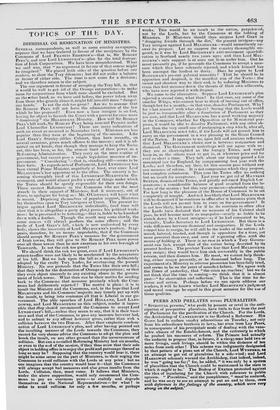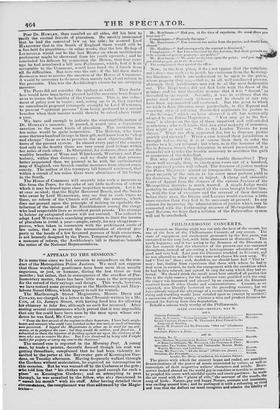PEERS AND PRELATES versus PLURALITIES.
" SPIRITUAL persons," who profit by present or revel in the anti- cipation of prospective pluralism, have little to fear from the zeal of Parliament for the purification of the Church. For the Lords, time Archbishop of CANTERBURY is WO Radical a Reformer. His Grace had to endure sundry admonitions on Tuesday, not only from his subordinate brethren in lawn, but even from Lay Peers, in consequence of his precipitate mode of dealing with the vene- rable abuses of the Establishment, and the extremity to which he pushed his measures of reform. The Primate had actually the audacity to propose that, in future, if a clergyman held two or more livings, such livings should be within the distance of tea miles from each other! This scheme was indignantly designated by that pattern of a pious sun of the Church, Lord WYNFORD, as an attempt to get rid of pluralities by a side-wind; and Lord HARROWBY solemnly warned the Archbishop, that indeed, indeed, he was " going too far;" for, he added, " it was only by a system of pluralities that the Church could be maintained in the state is which it ought to be." The Bishop of EXETER protested against the idea of legislating for the Church with reference to public opinion. " Pluralities," said the pamphleteer, " must be endured, and lie was scu ry to see an attempt to put an end to them, even with deference to the feelings of the country, which were very strong on the subject." Poor Dr. HOWLEY, thus assailed on all sides, did his best to pacify the excited friends of pluralism. He meekly insinuated that he had the canonical law on his side; he assured Lord HARROWBY that in the South of England there would still be a fine field for pluralities,—in other words, that the late Bishop of LICHFIELD would not he the last RYDER on whom multifarious preferment might be showered from his youth upwards ; and he concluded his defence by reminding the House, that four years ago he had introduced a bill into Parliament, which, had it bsen acceptable to the Commons, would have freed the Church from all its difficulties. But here was the rub : if the bill then under discussion were to receive the sanction of the House of Commons, it would be necessary to do more than merely talk about reform in the preamble. This was the Archbishop's excuse for his sweeping measure.
The Peers did not consider the apology as valid. They doubt- less would have been better pleased had the measure been framed so as to insure the hostility of the Commons. This is the refine-
ment of policy now in vogue; and, acting up to it, they rejected an amendment proposed (strangely enough) by Lord IV YNFOR D,
to prevent " spiritual persons" from being preferred to a second benefice when their income would thereby be raised above 10001. a year.
We have said enough to indicate the contemptible nature of Dr. HOWLEY'S measure. If passed, it would give a legislative
sanction to the worst kinds of pluralism. The testrirtion to ten miles would be quite inoperative. The Bishops, who have some thirteen hundred livings in their gift, well know how to "chop and change" them so as to preserve the most objectionable fea- tures of the present system. In almost every part of the country (not only in the South) there are very many good livings within ten miles of each other. In Shropshire, for instance, there are the wealthy benefices of Wem and Whitchurch, Westbury and Pon- tesbury, within that distance; and we doubt not that persons
better acquainted than we pretend to be with the ecclesiastical map of England, can furnish similar instances from almost every county. The author of this trumpery bill himself confessed, that within a circuit of ten miles there were abundance of let livings in the South.
The House of Commons will scarcely take such a measure as this from the Peers, for the sake of any little modicum of refbrm which it may be found upon close inspection to contain. Let it be at once scouted; that the Right Reverend Bench, and the Saints who swear by Lord HARROWBY, may see that in such times as these, no reform of the Church will satisfy the country, which does not proceed upon the principle of making an equitable dis- tribution of the income of the Establishment among the clergy who lead respectable lives as resident parish priests. The attempt to bolster up antiquated abuses will not succeed. The refusal to adopt Lord WYNFORD'S searching proposition to limit the income of pluralists to 10001. a year—ample, surely, for any clergyman— proves, when taken in connexion with the preferment circle of ten miles, that to prevent the accumulation of clerical pro- perty in the hands of a few favoured parsons of high connexion, is not honestly designed by the Peers, Temporal or Spiritual. As a measure of reform, the Archbishop's bill is therefore beneath the notice of the National Representatives.



























 Previous page
Previous page